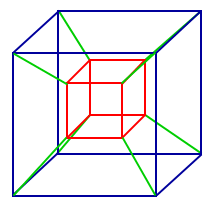You’ve seen all sorts of functions in calculus. Most of them are very nice and smooth— they’re “differentiable”, i.e., have derivatives defined everywhere. Some, like the absolute value function, have “problem points” where the derivative is not defined.
But is it possible to construct a continuous function that has “problem points” everywhere?
Surprisingly, the answer is yes! Weierstrass constructed the following example in 1872, which came as a total surprise. It is a continuous, but nowhere differentiable function, defined as an infinite series:
f(x) = SUMn=0 to infinity Bn cos (An * Pi * x)
where A and B can be any numbers such that B is between 0 and 1, and A * B is bigger than 1 + (3 * Pi/2). For instance, A=12, B=1/2 will work.
Presentation Suggestions:
Draw graphs of the first few terms in the series. The discontinuities come from the fact that the terms wiggle faster and faster as n gets larger. But the diminishing amplitude of the terms makes the series converge everywhere.
The Math Behind the Fact:
Showing this infinite sum of functions (i) converges, (ii) is continuous, but (iii) is not differentiable is usually done in an interesting course called real analysis (the study of properties of real numbers and functions). Property (ii) follows from the fact that this series exhibits uniform convergence, and in real analysis it is shown that a sequence of continuous functions that converges uniformly must converge to a continuous function.
How to Cite this Page:
Su, Francis E., et al. “Continuous but Nowhere Differentiable.” Math Fun Facts. <http://www.math.hmc.edu/funfacts>.
References:
A classic text on real analysis is Walter Rudin’s Principles of Mathematical Analysis.
Fun Fact suggested by:
Lesley Ward

